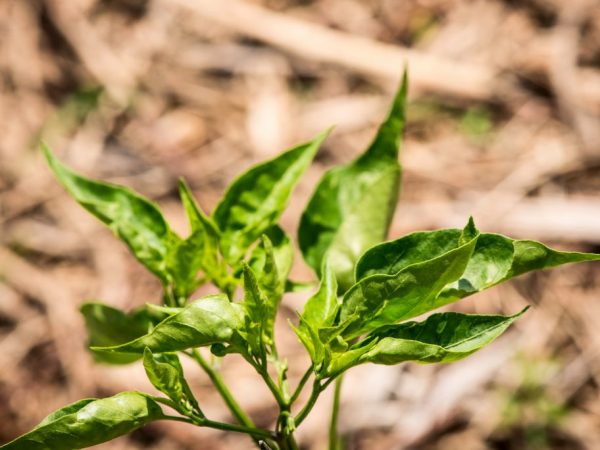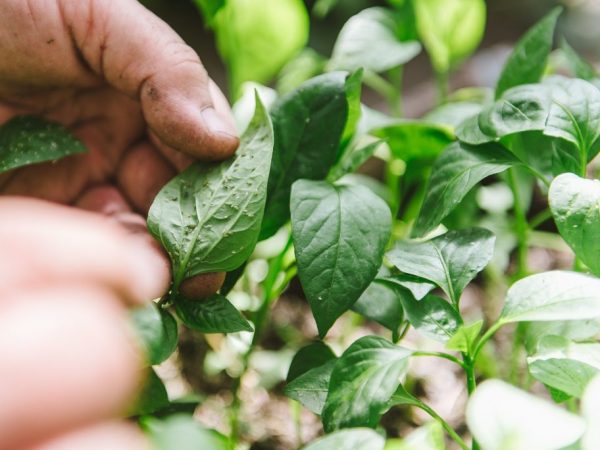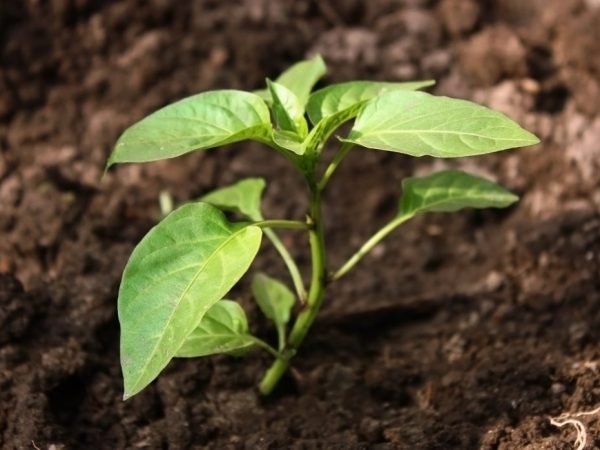For what reasons do pepper leaves fall
When the leaves of a pepper fall off, this is a signal that the plant lacks nutrients, or that it is affected by some kind of disease. To get rid of the problem and get a high-quality crop, you need to identify its cause.

Reasons for the leaves falling off the pepper
Causes
There are many reasons why pepper leaves fall. But among them, the main ones are distinguished: improper watering, lack of nutrients, adaptation after planting and pests.
Improper watering
Cold water is detrimental to the vegetable. Even a single watering will cause the culture to suspend its development. Watering should be carried out with warm water, the temperature of which should be above 20 ° C. The vegetable is quite demanding for irrigation. A poorly carried out process leads to the loss of leaves from the plant. Excess moisture or prolonged drought should be avoided.
Lack of nutrients
Lack of nutrients in the soil can also lead to foliage from bell peppers. Peat or clayey soils are unsuitable for planting this crop. In such soil, the plant lacks:
- nitrogen;
- calcium;
- potassium;
- phosphorus, etc.
An acute deficiency of nutrients is felt on depleted soils, where organic matter and mineral fertilizers have not been applied for a long time. The reaction of a crop to poor soil is manifested in yellowing, curling and falling of the lower leaves.
Transplant adaptation period
Pepper seedlings tolerate planting in open ground quite well. A heavy addiction awaits if you do not prepare her for the transplant in advance. The reasons for leaf fall during the adaptation period can be:
- unhardened seedlings;
- insufficiently heated soil during disembarkation;
- lack of vitamins and minerals in the soil;
- lack of sunlight.
Lighting is also important for adaptation. Sunlight affects full development. When planting seedlings in the shade or partial shade, their growth slows down, metabolic processes go wrong, so the leaves may fall off.
Pests

Pests prevent plants from growing fully
Pepper is a tasty vegetable for insects such as spider mites and aphids. They suck nutrients out of the sap of the plant. The aphid covers the leaves with sticky secretions, and the spider mite envelops them with a thin thread of cobwebs, as a result, the process of photosynthesis is disrupted. Weakened seedlings gradually dry up and die. Vegetables affected by pests will not die, but the quality of the harvest will greatly decrease.
Diseases
Among the reasons why the leaves of bell peppers fall are the diseases that the seedlings are susceptible to. Diseases affect plants with low immunity and protective functions.
Bacterial diseases
This category includes diseases such as black spot, bacterial wilting, and bacterial cancer.
To prevent their occurrence, it is recommended to observe the temperature regime and promptly remove dried parts and disinfect the soil for planting. For the treatment of such diseases, it is worthwhile to carry out:
- Digging up the soil, observing the crop rotation.
- Pruning damaged areas.
- Spraying with a solution of copper sulfate.
- Methyl bromide treatment.
Viral lesions
In case of viral diseases, the only preventive method can be considered the planting of virus-resistant pepper varieties: Aries, Zarya, Yubileiny, Dar Kasia, Atlant, Cardinal. Diseases of viral origin include tobacco and cucumber mosaics, as well as streak. Treatment methods include:
- Treatment of seeds before planting with a weak solution of potassium permanganate.
- Spraying seedlings with a mixture of milk and iodine.
- Treatment of the consequences of bacterial infections.
- Removing weeds in the beds.
Fungal diseases
Fungal diseases that cause leaf fall include brown spot and rot. These diseases are caused by the defeat of the vegetable by spores of fungi, which remain in the soil or enter with various fertilizers. For the treatment of pepper you need:
- Remove areas that are affected by the fungus.
- Treat with Bordeaux liquid.
- Sprinkle with garlic infusion.
To prevent leaf fall from pepper seedlings, it is worth regularly ventilating the greenhouse.
Do not allow stagnation of moisture in the soil and overgrowing with weeds. Compliance with the temperature regime has a favorable effect on the development of the plant, especially in the autumn period.
Landing rules

Pepper needs sunlight
For planting this vegetable crop, it is worth choosing a site that is well warmed up by the sun's rays. It should be borne in mind that slight shading in intense heat is recommended for all types of pepper, including quite light-loving ones, such as sweet and Bulgarian. But planting in the shade is not recommended. In regions with frequent rains or cloudy weather, the cultivation of a vegetable crop should be transferred to greenhouses, where it is possible to arrange additional lighting.
For planting this culture, choose a place with fertile soils that are neutral for acidity. Too acidic soil, it is worth preliminarily liming. Plan the introduction of dolomite flour for the autumn period for digging.
Care Tips
Pepper is a very demanding culture and with poor quality care it often gets sick and dies. To avoid the leaves falling off the pepper, you need to adhere to the following rules:
- When watering, it is necessary to observe the ratio of the temperature regime of water to air and soil. The water should be warm, but not lower than 5º from the air temperature. Do not water when the outdoor temperature drops below 17 ° C. Water should be applied directly to the root system of the plant, distributing it evenly. In a rather hot summer, additional irrigation should be carried out by irrigating the entire garden bed. A good time for watering is early morning or evening hours, while the earth is still warmed by the daytime sun.
- To increase the circulation of air and moisture in the soil, rotted manure should be added when preparing the soil for winter. Fresh humus is not recommended. Its high nitrogen content will have a detrimental effect on the yield. Peat should not be added as top dressing, because it increases acidity. A small amount of wood ash will have a beneficial effect on the growth of pepper, because the composition contains calcium, phosphorus and potassium. Organic fertilizers will help make the soil looser and lighter. The introduction of organic matter is carried out in the autumn. During flowering, when future vegetables begin to form, in order to improve the quality of the crop and prevent leaf shedding, it is worth feeding with complex mineral fertilizers. During this period, the culture needs superphosphates.
- Seedlings must be hardened immediately after transplanting into open ground.To do this, within 2 weeks before disembarkation, the seedlings must be alternately placed: during the day - on a balcony or terrace, and at night - left on the window in the house. It is worth planting only in warm ground, when the frost has already passed. To minimize sudden changes in temperature, cover them overnight and away from direct sunlight.
- It is worth regularly inspecting the stem of the plant for the absence of insects such as aphids and spider mites. It is worth taking immediate action when announcing the first signs of pests. A favorable time for the reproduction of parasites is dry and hot summers. It is during this period that an excessive population of aphids and spider mites should not be allowed on the lower leaves of the culture. Before color appears, pest insecticide treatment can be carried out. Do not increase the dose indicated on the label. The culture should be re-processed after 14 days. When the first ovaries appeared, treatment with insecticidal preparations is not recommended. It should be replaced with folk remedies. For processing, infusions based on tomato tops, dandelion mustard, chamomile or hot pepper are used. The best effect is given by alternating solutions with an interval of 3 to 10 days.
Conclusion
So that the pepper leaves do not fall off, it is necessary to bring preventive actions and proper treatment based on the reasons that caused it.


